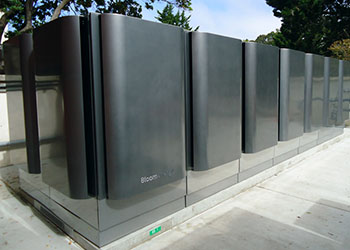Owens Corning has been well on its way to achieving a company-wide goal of reducing greenhouse gas emissions 20 percent by 2020. But, at its roofing and asphalt plant in Compton, California, it also was facing an average of one or two power outages events per week due to an overloaded local infrastructure.
As a leading global producer of building materials, glass-fiber reinforcements and engineered materials for composite systems, this energy issue was a challenging part of doing business.
Why Bloom?
As a result of these business disruptions and costs associated with them, plant officials in Compton, championed by E&S Leader Nico Armstrong, chose to implement the Bloom Energy Business Continuity solution to enhance the reliability of the plant’s critical manufacturing processes by providing 24/7 high quality, uninterruptible power.
Bloom provides unique fuel cell technology to produce onsite electricity without any combustion, thus eliminating harmful smog-forming particulates and reducing carbon dioxide emissions by about 30 percent compared to the electric grid.
Implementation
Owens Corning partnered with Bloom to install two 200-kilowatt Bloom Energy Servers sized to provide approximately 65 percent of the plant’s power over the course of a year.
These improvements are part of OC Compton’s plan to achieve its 2020 environmental footprint goal of reducing greenhouse gas emissions by 20 percent.

